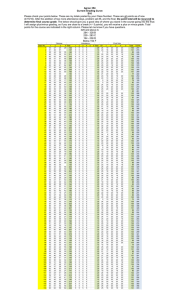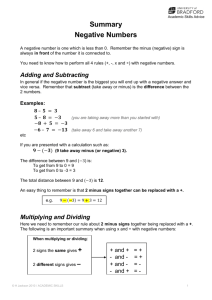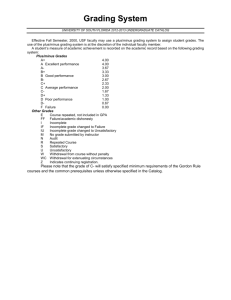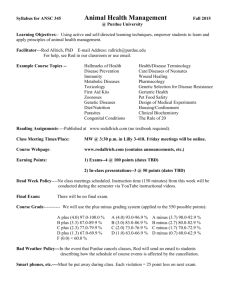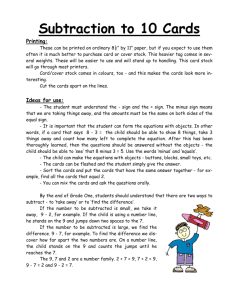Document 12234537
advertisement
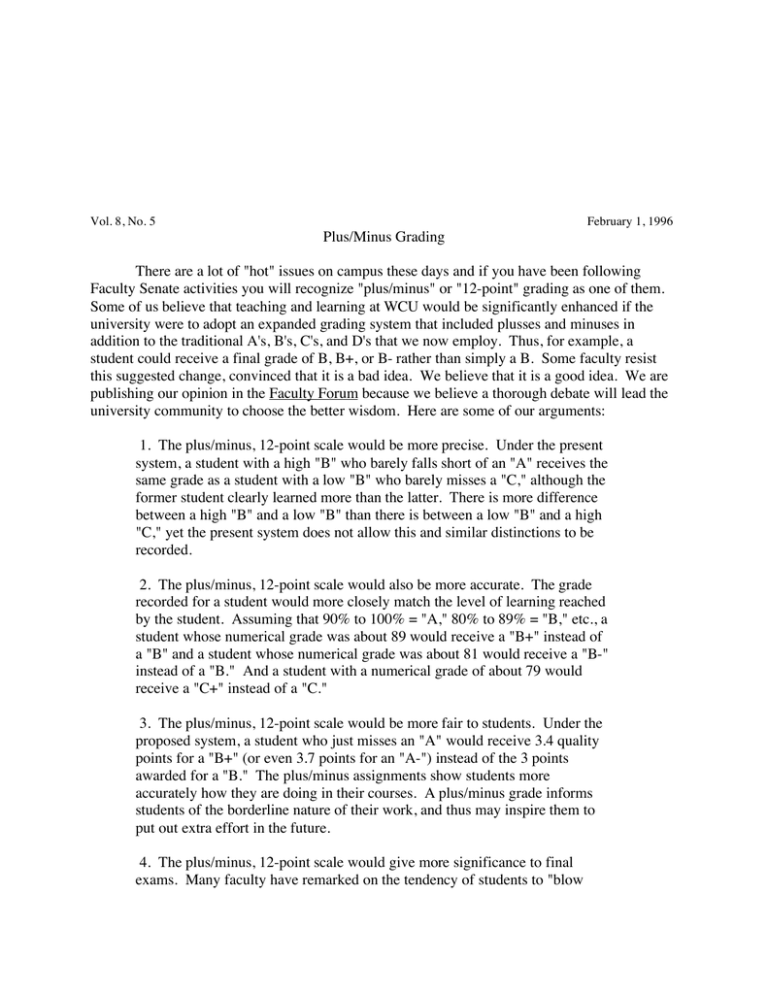
Vol. 8, No. 5 February 1, 1996 Plus/Minus Grading There are a lot of "hot" issues on campus these days and if you have been following Faculty Senate activities you will recognize "plus/minus" or "12-point" grading as one of them. Some of us believe that teaching and learning at WCU would be significantly enhanced if the university were to adopt an expanded grading system that included plusses and minuses in addition to the traditional A's, B's, C's, and D's that we now employ. Thus, for example, a student could receive a final grade of B, B+, or B- rather than simply a B. Some faculty resist this suggested change, convinced that it is a bad idea. We believe that it is a good idea. We are publishing our opinion in the Faculty Forum because we believe a thorough debate will lead the university community to choose the better wisdom. Here are some of our arguments: 1. The plus/minus, 12-point scale would be more precise. Under the present system, a student with a high "B" who barely falls short of an "A" receives the same grade as a student with a low "B" who barely misses a "C," although the former student clearly learned more than the latter. There is more difference between a high "B" and a low "B" than there is between a low "B" and a high "C," yet the present system does not allow this and similar distinctions to be recorded. 2. The plus/minus, 12-point scale would also be more accurate. The grade recorded for a student would more closely match the level of learning reached by the student. Assuming that 90% to 100% = "A," 80% to 89% = "B," etc., a student whose numerical grade was about 89 would receive a "B+" instead of a "B" and a student whose numerical grade was about 81 would receive a "B-" instead of a "B." And a student with a numerical grade of about 79 would receive a "C+" instead of a "C." 3. The plus/minus, 12-point scale would be more fair to students. Under the proposed system, a student who just misses an "A" would receive 3.4 quality points for a "B+" (or even 3.7 points for an "A-") instead of the 3 points awarded for a "B." The plus/minus assignments show students more accurately how they are doing in their courses. A plus/minus grade informs students of the borderline nature of their work, and thus may inspire them to put out extra effort in the future. 4. The plus/minus, 12-point scale would give more significance to final exams. Many faculty have remarked on the tendency of students to "blow off" final exams since students often assume they already have an immovable "B" or "C" in the course. This attitude implies that they do not believe their final exam performance will raise or lower, in a significant way, their course grade. With the plus/minus, 12-point scale the final exam should have a more meaningful effect on their final grade for the course. Since the difference between a "B" and a "B+" (or a "C" and a "C+") is .3 of a quality point, students might study more and do better on final exams and rightly receive a higher grade. 5. The plus/minus, 12-point scale should help reduce grade inflation. Many have objected to the grade inflation occurring at WCU and nationwide. Some grade inflation is perhaps an inevitable problem. Faculty are inclined to boost borderline "A/B" (or "B/C") students into the "A" (or "B") range because the students' work is better than that of others in the lower grade levels. However, this is inaccurate insofar as those in the "A" (or "B") range receive the same grade as those in the borderline area. Although inflation would likely continue to some extent under the new system, it would be less pronounced. Under the plus/minus system, students' grades would likely be raised only one third of a letter grade rather than a whole letter grade as allowed under the current system. 6. The plus/minus, 12-point scale preserves faculty freedom in assigning grades. Under the present system, some faculty seldom or never record "F's" for students whereas others seldom assign "A's." This freedom would continue. Those faculty who believe that the plus/minus, 12-point scale is too fine in some circumstances could continue recording grades as "A," "B," "C," etc. The proposal for the plus/minus scale is charitable in that it allows faculty not to add pluses and minuses to their grade evaluations when they believe it is not justified. However, for other faculty who often need finer distinctions than the present system offers, the plus/minus system provides a more precise and accurate reporting of students' levels of learning. We are expected to be professionals on whose judgment others in society rely. We assume it is obvious that we need competent and well-educated members of the professions: business and industry, education, medicine, law, and the fine and performing arts. The university was established primarily for the purpose of educating people to enter these professions. We, the faculty, are obligated to provide the best possible opportunities for learning to students and to give our best possible judgment about the levels of learning attained by the students. Business and industry and professional and graduate schools depend on our judgment about the educational achievement of our students. None of us would disagree about our obligation to motivate and guide the students' learning; the disagreement here concerns our obligation to render our best judgment about the students' levels of learning, that is, grades. Some of the debate we have heard suggests that the purpose of grades is to make students feel good about themselves. How many of us would be satisfied with a physician's deceiving us about our health because "The truth would make you feel bad." How many of us would be satisfied with a physician's diagnosis as: "It's some sort of pneumonia. I don't know exactly what kind, but it doesn't matter." We expect better of physicians, lawyers, and engineers, and they and the rest of society expect better of us. The plus/minus grading system would enable us to record our judgments more precisely and accurately than the present system. It would also be more fair to students, would give more significance to final exams, should help reduce grade inflation, and would preserve faculty freedom in assigning grades. This is what we believe and why. Do you agree? Do you disagree? What's your opinion? Daryl Hale, Philosophy & Religion Mike Jones, Philosophy & Religion Jim McLachlan, Philosophy & Religion Henry Mainwaring, Biology Send responses to the Faculty Center by the 8th of the month. Your responses will be published in notes & quotes on the 15th.
